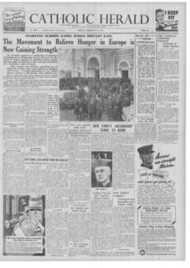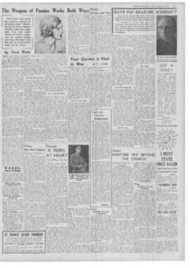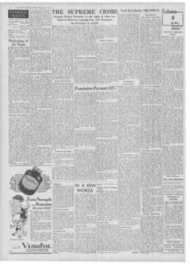Page 6, 19th February 1943
Page 6

Report an error
Noticed an error on this page?If you've noticed an error in this article please click here to report it.
Tags
Share
Related articles
Irish News Letter
Irish News Letter
Irish News Letter
News About Ireland
Jap War Affects Eire
Negroes Love Liturgy
Irish News Letter
THE BELFAST BY-ELECTION RESULT SURPRISES EVERYONE
From Our Own Correspondent.
DUBLIN
The by-election in Belfast astonished everybody Mr. Beattie, the most vigorous Labour figure in Northern lieland, topped the poll with a inal:gin of thousands over the official Unionist, to whom Mr. Churchill had telegraphed good wishes. After his victory, Mr. Beattie iroqically telegraphed thanks to Mr. Churchill.
l'he Independent Unionist came third, and Mr. Hugh Corvin (formerly chailman of the Northern Council for Unity, and only Catholic candidate) came at the tail of the poll and lost his deposit. Mr. Corvine: defeat surprised those who judged his chances by Mr. Donnelly's I scent anti-Partition victory; hut there was a ditTerence in the candidate's position. Mr. Donnelly was known as a lieutenant of Mr. de Valera, and Northern Nationalism closed the ranks to return him. Mr. Corvin put forward a new policy. and Northern Nationalists proved unwilling to follow. The result of Mr. Corvin's departure was that the Catholic vote went to the
I.ahour candidate. Mr. Beattie's victory is for a Nationalist-Labour alliance.
EDUCATION „IDEALS A proposal has been discussed in some intluentiil papers-1 (to not know with wham it originated—that SixCounty Nationalists should be allowed to le ing their schools under the Dublin Ministry of Education. : The point is that the minority in the Six-Counties is palpably and admittedly part and parcel of the nation in whose tradition the Dublin programmes are shaped, and that a chief hardship of minorities in modern States is that they are forced to surrender their children to a culture which may be excellent but is not their own. If we arc not totalitarians, must we not allo& minorities to pursue the educational programmes which conform to their ideals? •
Within the Twenty-Six Counties a similar issue exists. The Protestant minority has a distinctive educational tradition. It is allowed/ to follow that tradition. As long as its schools are of approved efficiency, they have equal rights with Catholic schools, and even some special privileges. On account of the spaiseness of the Protestant population, the State even provides transpoi t to brinethe children of " scattered Protestants " to their schools.
In the recent Senate debates on education a Protestant spokesman has complained of powers given to the Minister to approve and disapprove schools. It is alleged that the pdrpose is to disapprove ,chools in England, to which Protestants like to send their children. A Protestant patriot has written, " quite right too "—he wishes the State to intervene to oblige the minority to educate its children as Irishmen, in the fullest sense.
With due respect, one thinks that the Irish tradition of cultural liberty is better, and that the Southern minority which prefers an English eddcation should be free to have it, finding its due place in national life (or outside it) later: while, in like manner, the Northern minority should be free to enjoy an Irish education.
Partition remains to be solved; but one great and vital grievance would be temoved if the Northern minority were free—as the Southern minority already is, despite the Senator's fear—to pursue the culture nucl tradition which has its devotion.
Need Partition he totalitarian?
MARRY OR PERISH!
The Catholic Social Week in Dublin is proving a greater success than ever, though, writing in mid-week, I cannot attempt a summary. of its admirable proceedings. The most interesting paper, perhaps, is that read by the Rev. Dr. Lucey, the champion of family allowtnees, who declared that one reason why young people were not marrying was the decay of the traditional institution of matchmaking in face of the criticism and ridicule directed against it by smart playwrights and novelists. This was particularly I rue of rural Ireland. Other causes were the housing shortage in town and country, the selfishness of parents, and growing materialism among the young.
" Early marriages, big families— these are what the Church recommends, these arc what nature demands as the guarantee of our survival as a people and a nation, and these are what we have not in the Ireland of to-day," Dr. Lucey said.
" The Christian teaching on marriage was not only embodied in the Constitution, but was actively promoted by legislation. The State could be no stronger than the strength of the families that composed it.
"All credit, therefore, to our statesmen, who have recognised that the more the marriages the greater the country, blessed with their fruitfulness and happiness.
" The flight from parenthood was but the obverse side of the flight to self-comfort. We must have early and fruitful marriages or perish as a Catholic nation."
blog comments powered by Disqus







